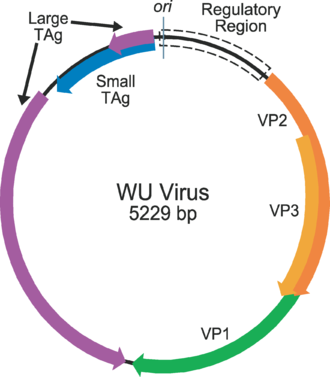Large tumor antigen



Large Tumor Antigen (often abbreviated as Large T or LT) is a viral protein that plays a crucial role in the life cycle of polyomaviruses, a group of DNA viruses. This protein is essential for viral replication and has been extensively studied in the context of its role in viral pathogenesis, particularly in relation to its ability to induce tumor formation in infected hosts.
Function[edit]
The primary function of Large Tumor Antigen is to initiate and sustain viral DNA replication within the host cell. It achieves this by binding to the viral origin of replication and recruiting the host's DNA synthesis machinery. Furthermore, Large T has the ability to disrupt normal cell cycle regulation, pushing cells into the DNA synthesis phase (S phase), which is advantageous for viral replication.
Large T Antigen also interacts with several host cell proteins that are key regulators of the cell cycle, including the tumor suppressor proteins p53 and Rb. By binding to these proteins, Large T Antigen can inhibit their tumor suppressive functions, leading to uncontrolled cell proliferation and the potential development of tumors.
Role in Tumorigenesis[edit]
The interaction of Large Tumor Antigen with p53 and Rb is of particular interest in the study of tumorigenesis. The inactivation of these tumor suppressor proteins can lead to the loss of cell cycle control, evasion of apoptosis (programmed cell death), and increased genomic instability, all of which are hallmarks of cancer. Consequently, the expression of Large T Antigen in cells is closely associated with the transformation of normal cells into cancerous cells, making it a subject of intense research in oncology and virology.
Clinical Significance[edit]
The study of Large Tumor Antigen has implications for understanding the mechanisms of virus-induced cancer. It provides insights into how viruses can hijack cellular machinery for their replication and how this process can lead to the development of cancer. This knowledge is crucial for the development of targeted therapies and vaccines against viruses that utilize Large T Antigen or similar proteins to induce tumorigenesis.
Research Applications[edit]
In addition to its significance in understanding viral oncogenesis, Large Tumor Antigen is also used as a tool in molecular biology research. It has been employed in the creation of immortalized cell lines, which are essential for various types of biomedical research, including cancer research, drug development, and gene therapy studies.
Conclusion[edit]
Large Tumor Antigen is a multifunctional protein that plays a critical role in the replication and pathogenesis of polyomaviruses. Its ability to disrupt normal cell cycle regulation and interact with key tumor suppressor proteins makes it a pivotal factor in the study of virus-induced tumorigenesis. Ongoing research into Large T Antigen and its interactions with host cell machinery continues to provide valuable insights into the mechanisms of cancer development and potential therapeutic strategies.
Ad. Transform your life with W8MD's Budget GLP-1 injections from $49.99


W8MD offers a medical weight loss program to lose weight in Philadelphia. Our physician-supervised medical weight loss provides:
- Weight loss injections in NYC (generic and brand names):
- Zepbound / Mounjaro, Wegovy / Ozempic, Saxenda
- Most insurances accepted or discounted self-pay rates. We will obtain insurance prior authorizations if needed.
- Generic GLP1 weight loss injections from $49.99 for the starting dose of Semaglutide and $65.00 for Tirzepatide.
- Also offer prescription weight loss medications including Phentermine, Qsymia, Diethylpropion, Contrave etc.
NYC weight loss doctor appointmentsNYC weight loss doctor appointments
Start your NYC weight loss journey today at our NYC medical weight loss and Philadelphia medical weight loss clinics.
- Call 718-946-5500 to lose weight in NYC or for medical weight loss in Philadelphia 215-676-2334.
- Tags:NYC medical weight loss, Philadelphia lose weight Zepbound NYC, Budget GLP1 weight loss injections, Wegovy Philadelphia, Wegovy NYC, Philadelphia medical weight loss, Brookly weight loss and Wegovy NYC
|
WikiMD's Wellness Encyclopedia |
| Let Food Be Thy Medicine Medicine Thy Food - Hippocrates |
Medical Disclaimer: WikiMD is not a substitute for professional medical advice. The information on WikiMD is provided as an information resource only, may be incorrect, outdated or misleading, and is not to be used or relied on for any diagnostic or treatment purposes. Please consult your health care provider before making any healthcare decisions or for guidance about a specific medical condition. WikiMD expressly disclaims responsibility, and shall have no liability, for any damages, loss, injury, or liability whatsoever suffered as a result of your reliance on the information contained in this site. By visiting this site you agree to the foregoing terms and conditions, which may from time to time be changed or supplemented by WikiMD. If you do not agree to the foregoing terms and conditions, you should not enter or use this site. See full disclaimer.
Credits:Most images are courtesy of Wikimedia commons, and templates, categories Wikipedia, licensed under CC BY SA or similar.
Translate this page: - East Asian
中文,
日本,
한국어,
South Asian
हिन्दी,
தமிழ்,
తెలుగు,
Urdu,
ಕನ್ನಡ,
Southeast Asian
Indonesian,
Vietnamese,
Thai,
မြန်မာဘာသာ,
বাংলা
European
español,
Deutsch,
français,
Greek,
português do Brasil,
polski,
română,
русский,
Nederlands,
norsk,
svenska,
suomi,
Italian
Middle Eastern & African
عربى,
Turkish,
Persian,
Hebrew,
Afrikaans,
isiZulu,
Kiswahili,
Other
Bulgarian,
Hungarian,
Czech,
Swedish,
മലയാളം,
मराठी,
ਪੰਜਾਬੀ,
ગુજરાતી,
Portuguese,
Ukrainian
